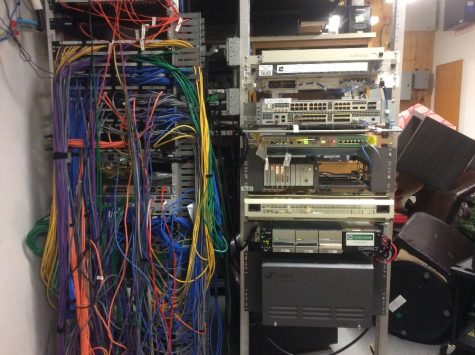What happens when the internet goes down at B-A?
When the internet goes down, teachers are sent scrambling for ways to continue teaching without online lessons and resources.
September 25, 2020
Wednesday, September 16, was a dark day at Bellwood-Antis High School.
Students and faculty couldn’t do anything because the internet went down across the district.
It was a tough blow, considering the COVID-19 pandemic has forced school districts everywhere to rely on technology and the internet more than ever.
When the internet goes down, some teachers are not prepared for the interruption while others are. Many teachers have paper copies of the work the students have to do. Earlier in the week last week the internet was spotty, so a number of the teachers got these ready in case the internet went done.

B-A teachers say it is more time consuming when the internet goes down.
“I can teach the lessons much quicker when I am not trouble shooting technology issues,” said math teacher Mrs. Kristeen Riddle, who added that virtual students lose out because of the loss of internet because teachers cannot connect with them.
“I make paper copies of tests, notes, and worksheets. Teachers must find other ways to get info and material to virtual students when the internet is out,” Mrs. Riddle said.
Some students don’t have study halls, so teachers last week had to take time out of class so students could make up tests they missed when the internet was out.
Over the last several years, with 1-to-1 iPad distribution taking hold at B-A, teachers have shifted much of their materials to Google classroom, which can be inconvenient when the internet is down.
“I save papers from previous years and dig them out to make copies, ” said Mrs. Holly Carney, another math teacher. I have everything saved on a jump drive, and I use my personal cell phone to access Google Classroom and Teams when the internet is down and I can’t use my iPad or computer.”
All the teachers can at least agree on one thing. When the internet goes down, it makes it more difficult and very stressful. Not only can teachers not access files, but they can’t print because printers are networked into the computer system.
At the end of the day when the internet goes down it makes more work for the teachers. Mr. McNaul said he tries to load videos before the internet glitches out.
“We resort to class discussions and what we can present on the board,” he said.
Mr. Jason Corle, one of the top members of B-A’s I-T department, said, “The first step in our process is to determine if the issue is district wide. If it is, we the need to determine if the ISP (Internet Service Provider) is having an issue or if the problem is internal. If the issue is with the ISP there’s not much we can do, but wait.”
If the issue is internal, the I-T staff must begin an investigation to troubleshoot the internal problem.
“Using the tools available to us via Cisco Meraki network, we try to isolate where the issue is. Tthis is most often the most difficult part.”
Often, the district calls nearby PC works, and as an outside Tech support they are able to check on the systems remotely.
Mr. Corle said the biggest issue he said they face is “ there is an absolute need for internet service, so it’s vital that we get things back and running as soon as possible.”






